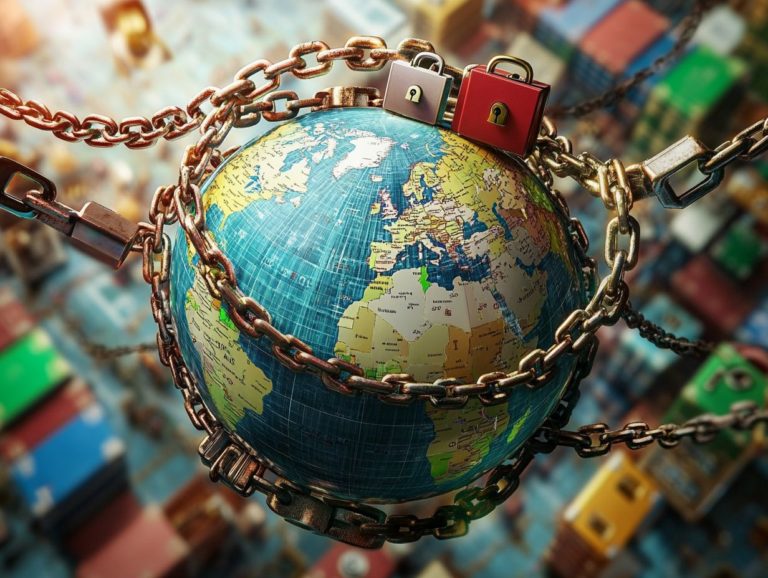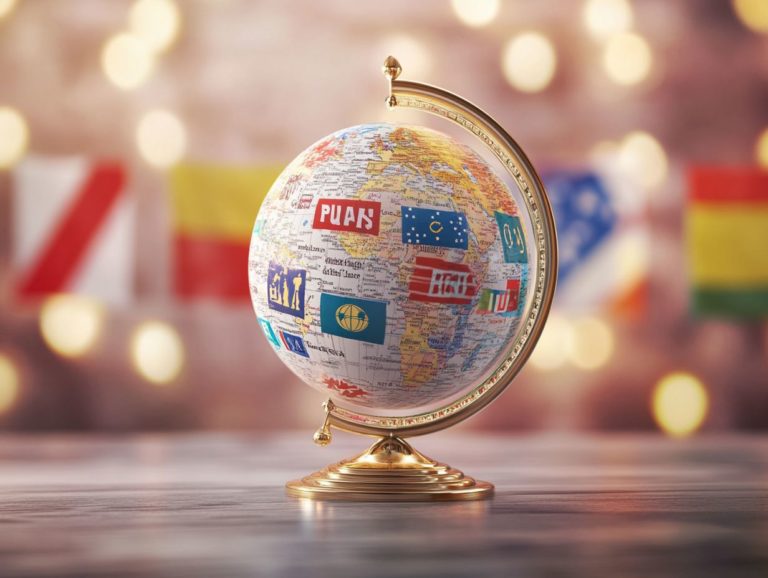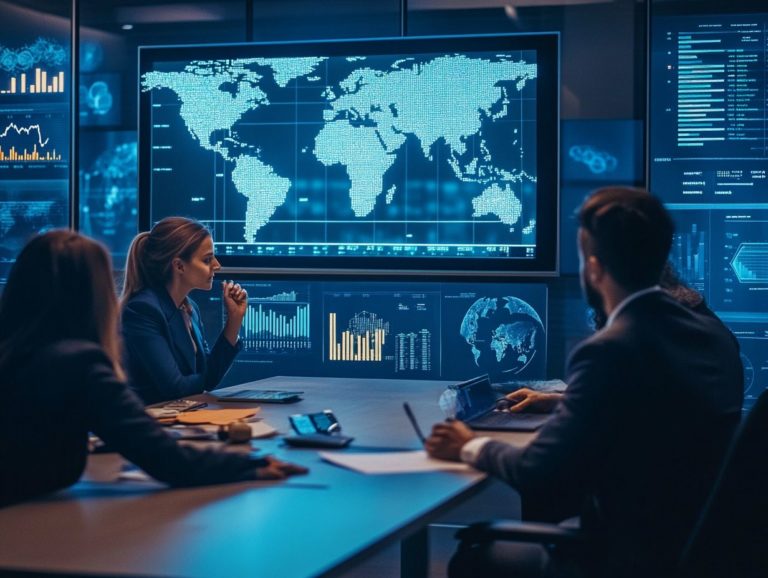The Role of Customs in Protecting IP Rights
Laws that protect the ideas and creations of people (IP rights) are essential for fostering innovation and driving economic growth. Yet, they are constantly threatened by counterfeiting and piracy.
Customs authorities are your frontline defenders, working diligently at borders to ensure that counterfeit goods do not infiltrate the market and jeopardize legitimate businesses.
This article explores how customs protect IP through thorough inspections, strategic seizures, and collaboration with various agencies. It also highlights the challenges they face in an ever-evolving global landscape.
Discover the initiatives aimed at enhancing customs’ capabilities and the critical role of international cooperation in combatting IP infringement.
Contents
- Key Takeaways:
- Defining and Explaining IP Rights
- Why Customs are Important for Protecting IP Rights
- Methods Used by Customs to Protect Intellectual Property Rights
- Challenges Faced by Customs in Protecting Intellectual Property Rights
- Efforts to Strengthen Customs’ Role in Protecting IP Rights
- Frequently Asked Questions
- What is the role of customs in protecting intellectual property (IP) rights?
- How do customs officers identify goods that infringe on IP rights?
- What happens when customs officers seize goods that infringe on IP rights?
- Can customs officers stop all counterfeit and pirated goods from entering a country?
- Are customs officers the only ones responsible for protecting IP rights?
- What can individuals and businesses do to support customs in protecting IP rights?
- Supporting Customs in Protecting IP Rights
- What Happens When Goods Are Seized?
- Can Customs Stop All Fake Goods?
- Who is Responsible for Protecting IP Rights?
Key Takeaways:
- Customs protect intellectual property rights at borders.
- Counterfeiting harms the economy and businesses.
- International cooperation and technology enhance customs’ effectiveness.
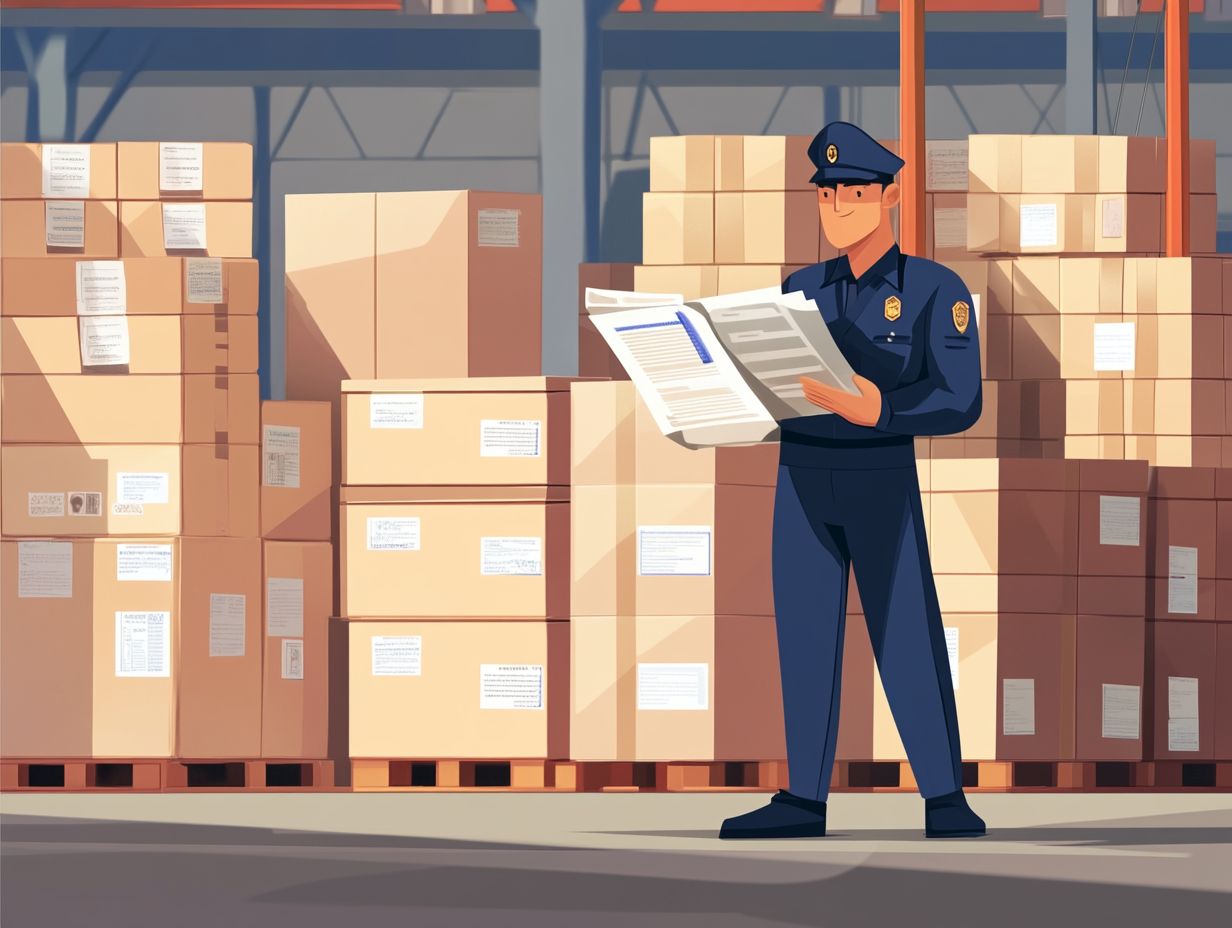
Defining and Explaining IP Rights
Intellectual Property (IP) Rights protect creators and their work, ensuring they can benefit from their inventions and ideas.
These rights allow businesses to thrive without the threat of infringement. They include trademarks, which preserve brand identity, and copyrights, which protect creative works like literature and music.
In the United States, these protections are upheld by entities such as the U.S. Patent and Trademark Office and the U.S. Copyright Office, each playing a distinct role in the management and registration of intellectual property.
Why Customs are Important for Protecting IP Rights
U.S. Customs and Border Protection (CBP) plays a pivotal role in safeguarding intellectual property rights by rigorously enforcing laws that prevent the importation of counterfeit goods and other violations threatening legitimate trade.
By monitoring and inspecting goods at the border, CBP helps ensure that businesses can thrive in a marketplace free from infringing products that could undermine their trademarks and copyrights.
This enforcement is vital for keeping our marketplace fair and thriving!
Role of Customs in Border Control
The role of U.S. Customs and Border Protection in border control is crucial for preventing counterfeit goods from entering the market, safeguarding your intellectual property rights, and ensuring compliance with national regulations.
Through careful checks and modern technology, customs authorities excel at identifying and seizing infringing products before they reach consumers. These inspections involve detailed evaluations of shipments, often in collaboration with trademark owners who provide vital insights about authentic products.
By partnering with businesses, customs creates a robust monitoring system that not only detects counterfeit items but also educates companies on compliance requirements. This collaborative effort helps businesses uphold their reputation and fosters a fair marketplace, ultimately benefiting consumers by ensuring the quality and integrity of available products.
Impact of Counterfeiting and Piracy on the Economy
Counterfeiting and piracy seriously harm the economy, leading to significant financial losses for businesses and undermining the integrity of intellectual property rights.
These illicit activities threaten the foundation of fair competition and result in substantial job losses as companies struggle to maintain their profit margins.
As authentic products lose market share, tax revenues dwindle, creating a ripple effect that adversely affects public services and infrastructure.
The lack of innovation becomes increasingly evident; entrepreneurs and established companies hesitate to invest in new ideas without the necessary protections.
Therefore, it is essential to implement robust enforcement mechanisms. Strong penalties against offenders act as a deterrent, ensuring that the value of creativity and original work is preserved for future generations.
Methods Used by Customs to Protect Intellectual Property Rights
Customs employs various sophisticated methods to safeguard intellectual property rights (IPR). This includes thorough inspections and the seizure of infringing goods. Proactive initiatives like the e-Recordation Program also play a vital role.
This program streamlines the process of recording trademarks and copyrights, ensuring better protection for your valuable assets.
Inspections and Seizures
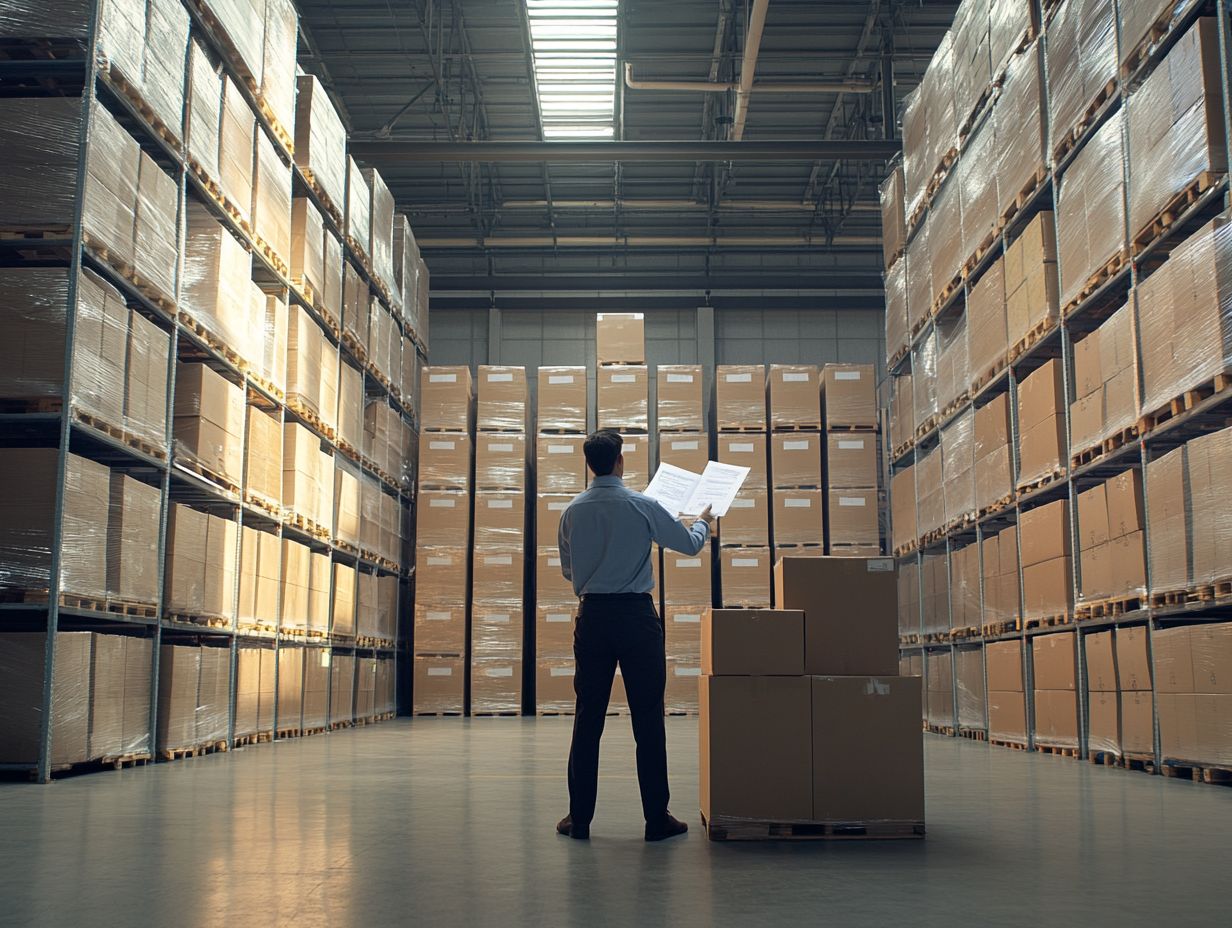
Customs officials thoroughly inspect every package to protect you from counterfeit goods! Inspections and seizures by U.S. Customs and Border Protection are crucial in the fight against counterfeit imports.
These inspections involve a careful examination of shipping containers and packages. Officials use both physical and technological methods to ensure thoroughness.
When authorities detect potential infringement, they assess the goods against registered intellectual property rights. This scrutiny protects original manufacturers and warns potential violators about the legal consequences of counterfeiting.
Seizures can lead to significant financial penalties and legal action against infringers. This highlights the importance of upholding these rights to safeguard businesses and promote fair competition in the marketplace.
Collaboration with Other Agencies
Collaboration between U.S. Customs and Border Protection and agencies like the U.S. Patent and Trademark Office and the U.S. Copyright Office is essential for enforcing intellectual property rights effectively.
This partnership allows for comprehensive strategies that address immediate threats from counterfeit products and promote long-term compliance across various industries.
Joint training programs and information-sharing initiatives enhance their ability to identify and seize infringing merchandise at borders.
Campaigns that raise public awareness about respecting intellectual property rights enable you, the consumer, to make informed choices. These collaborative efforts can make significant progress in protecting innovation and ensuring fair competition in the marketplace.
Challenges Faced by Customs in Protecting Intellectual Property Rights
Customs faces a variety of challenges in safeguarding intellectual property rights.
The dynamics of globalization and the rise of e-commerce complicate enforcement efforts and stretch limited resources thin.
The Challenge of Globalization and Online Shopping
The rapid growth of globalization and online shopping has increased the presence of counterfeit goods. This creates considerable hurdles for customs enforcement in protecting intellectual property rights.
When you shop online, it can be hard to resist cheaper imitation products, unintentionally driving up demand for counterfeit items. This surge complicates matters for customs officials, who already deal with a staggering volume of packages arriving daily.
Often, they lack the resources and technology to trace the origins and authenticity of goods effectively. The anonymity of online sellers adds to the challenge, making it increasingly difficult to identify and hold accountable those distributing counterfeit products.
These challenges make the fight against counterfeiting even more critical!
Limited Resources and Training
Limited resources and the need for specialized training among customs authorities significantly hinder their ability to enforce intellectual property rights effectively.
This shortfall impacts the economy by eroding the competitive edge of genuine products and fostering an environment for illicit goods to thrive.
Ongoing training for customs officers is essential. It equips them with the skills to identify counterfeit items and understand the complexities of IPR.
By enhancing their expertise, officials can improve their response to violations, thereby protecting both consumers and legitimate businesses from the negative impacts of piracy and counterfeiting.
Join the fight against counterfeiting and support genuine products today!
Efforts to Strengthen Customs’ Role in Protecting IP Rights
Your efforts to enhance customs’ role in protecting intellectual property rights involve cultivating international cooperation and harnessing technological advancements.
This strategic approach enables more effective detection and enforcement of IP violations, ensuring robust protection in an increasingly interconnected world.
International Cooperation and Harmonization
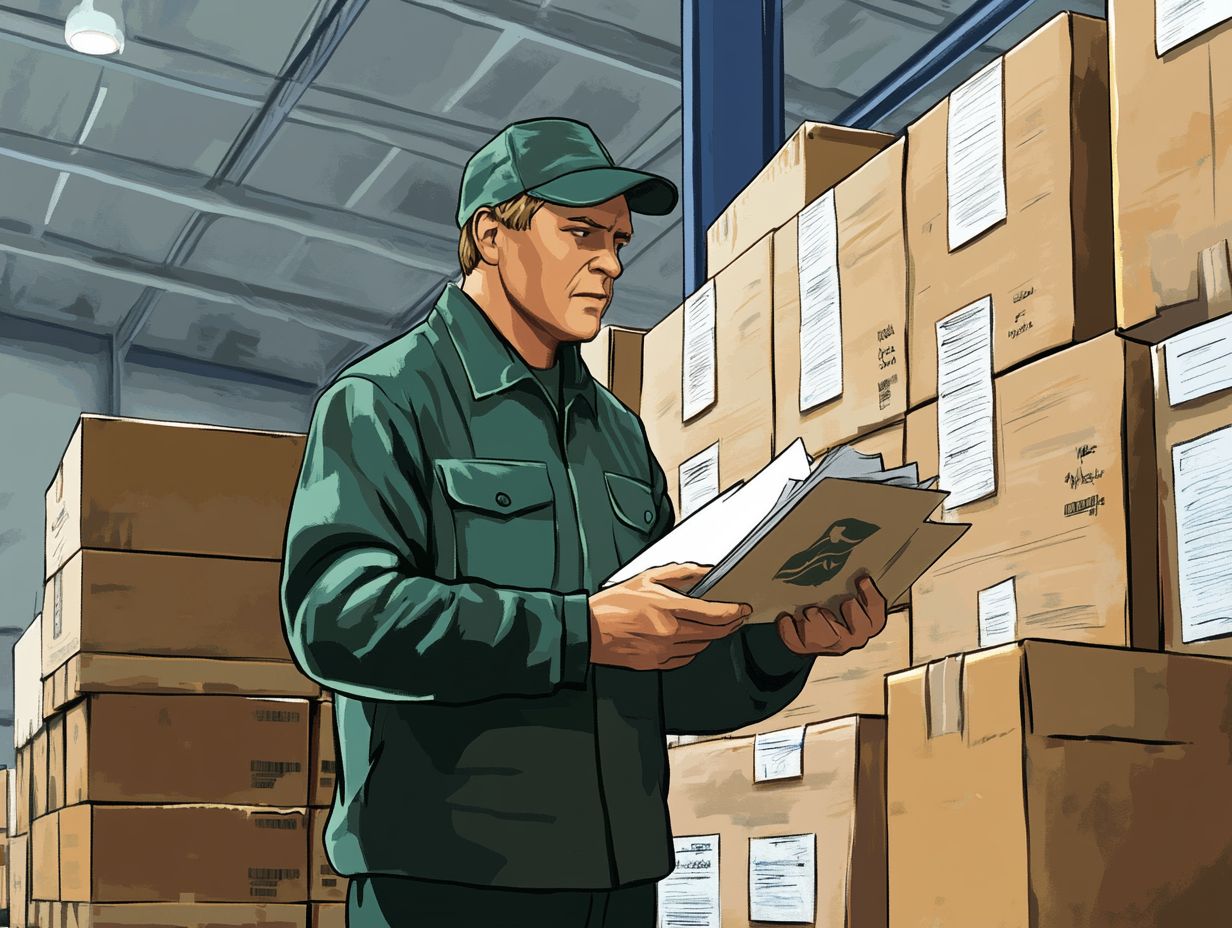
International cooperation and harmonization among customs authorities are essential for establishing effective frameworks to protect intellectual property rights across borders. Such collaborations enable you to share vital information, enabling countries to confront the challenges of counterfeiting and piracy together.
By aligning regulatory standards, nations can create a more robust enforcement mechanism that adeptly addresses the complexities of IP infringement in an increasingly globalized market.
This unified approach not only strengthens individual regulations but also fosters a sense of collective responsibility, allowing law enforcement agencies to act swiftly against violators.
This builds trust and transparency among trading partners, ultimately benefiting consumers by ensuring the authenticity and safety of products in the marketplace.
Technological Advancements in Detection and Enforcement
Technological advancements significantly enhance customs authorities’ ability to detect and enforce compliance with intellectual property rights.
By embracing cutting-edge technologies like data analytics and artificial intelligence, customs can analyze shipping data to identify patterns that suggest the presence of counterfeit goods.
These advanced tools enable officials to swiftly target high-risk shipments, allowing for prompt intervention before counterfeit products can infiltrate the market.
With advanced tracking systems in place, you gain real-time monitoring of goods, greatly improving the ability to trace and attribute suspicious parcels.
This continuous evolution of technology not only boosts the effectiveness of enforcement actions but also serves as a formidable deterrent for anyone considering involvement in the production and distribution of counterfeit items.
Frequently Asked Questions
What is the role of customs in protecting intellectual property (IP) rights?
The role of customs in protecting IP rights is to prevent the entry of counterfeit or pirated goods into a country. Customs officers work closely with customs agencies in other countries to identify and seize goods that infringe on IP rights, such as fake designer products or pirated movies and music.
How do customs officers identify goods that infringe on IP rights?
Customs officers use a variety of techniques to identify goods that infringe on IP rights, including physical inspections, x-ray machines, and documentation checks. They are also trained to recognize common trademarks and logos.
What happens when customs officers seize goods that infringe on IP rights?
When customs officers seize goods that infringe on IP rights, they will usually notify the brand owner or rights holder. The goods will then be inspected and authenticated, and if they are found to be counterfeit or pirated, they will be destroyed. In some cases, legal action may also be taken against the importer or seller of the goods.
Can customs officers stop all counterfeit and pirated goods from entering a country?
While customs officers play a vital role in protecting IP rights, it is not possible for them to stop all counterfeit and pirated goods from entering a country. However, their efforts can significantly reduce the volume of these goods and deter potential counterfeiters and pirates.
Are customs officers the only ones responsible for protecting IP rights?
No, customs officers are not the only ones responsible for protecting IP rights. While they play a crucial role in preventing the entry of counterfeit and pirated goods, it is also the responsibility of brand owners and rights holders to monitor and enforce their own IP rights through legal means.
What can individuals and businesses do to support customs in protecting IP rights?
You can report suspicious products and educate others about recognizing counterfeit goods. This helps create a more informed consumer base and supports customs in their ongoing efforts to protect intellectual property rights.
Supporting Customs in Protecting IP Rights
Individuals and businesses can help customs protect IP rights. They should be aware of fake or stolen products and avoid buying or selling them.
If suspicious activity is noticed, report it to customs or the relevant brand owner. Businesses can also collaborate with customs to provide training on identifying fake goods.
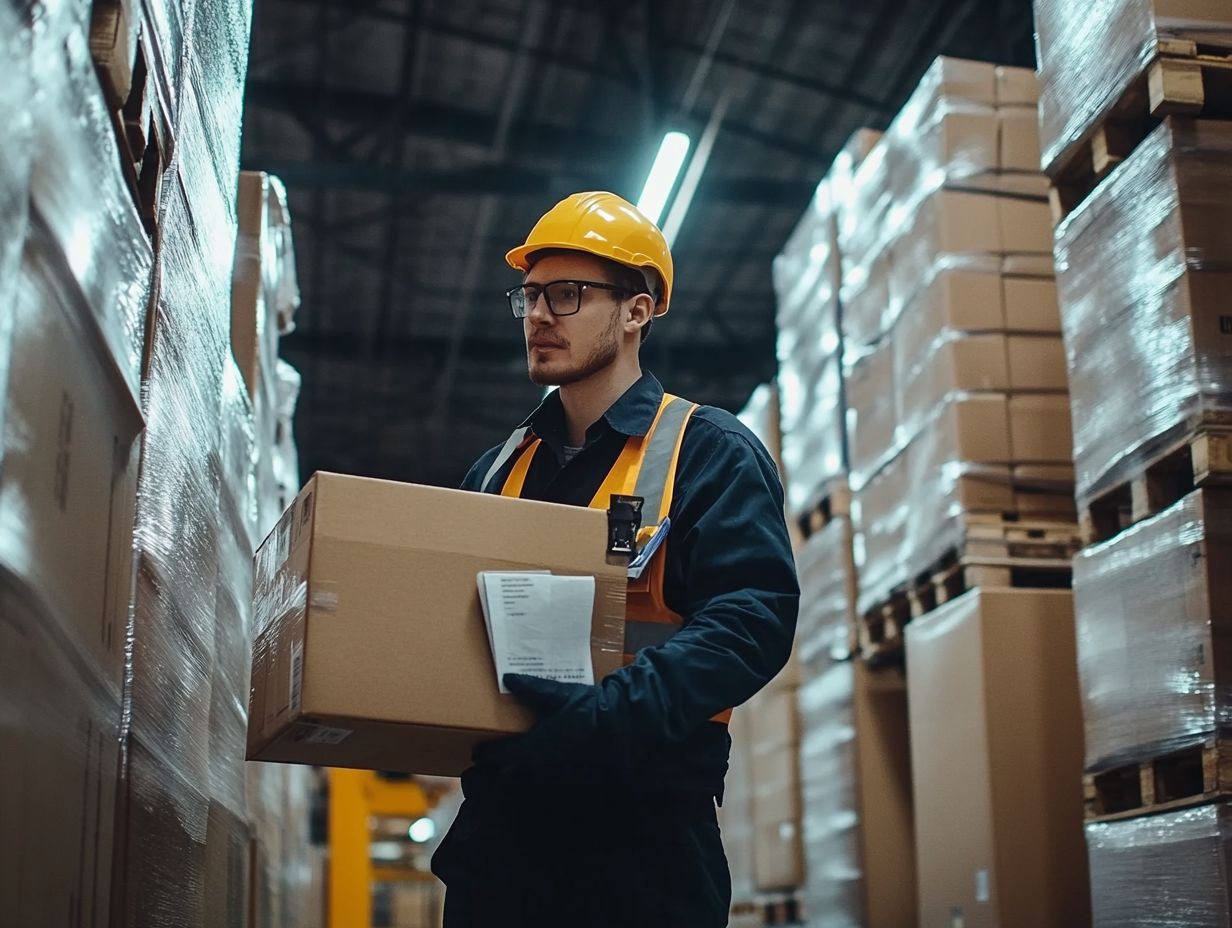
Customs officers use various techniques to spot fake goods. They conduct physical inspections and use x-ray machines and documentation checks.
Officers are trained to recognize common trademarks and logos. They may also work with brand owners to identify potential counterfeits.
What Happens When Goods Are Seized?
When customs seizes goods that infringe IP rights, they notify the brand owner. The goods are inspected, and if deemed counterfeit, they are destroyed.
Legal action may be taken against the seller or importer in some cases.
Can Customs Stop All Fake Goods?
Customs officers cannot stop all fake goods from entering a country, but their efforts significantly reduce the volume of these goods!
Who is Responsible for Protecting IP Rights?
No, customs officers are not the only ones responsible for IP rights protection. Brand owners also have a duty to monitor and enforce their rights.


